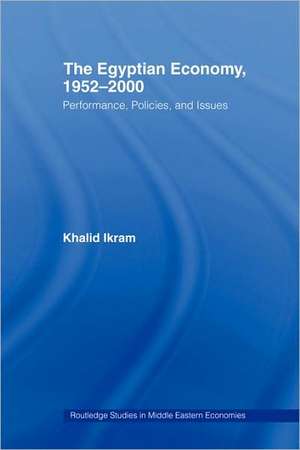The Egyptian Economy, 1952-2000: Performance Policies and Issues: Routledge Studies in Middle Eastern Economies
Autor Khalid Ikramen Limba Engleză Paperback – 21 noi 2005
* the performance of the Egyptian economy since 1950s
* the factors that have facilitated or retarded economic performance
* the Egyptian authorities approach to economic issues and policy-making
* the chief questions that policy-makers will have to deal with in the next twenty years.
Set apart by Khalid Ikram’s intimate knowledge of the Egyptian policy-makers this book presents a unique account of economic development and policy-making in Egypt during 1952 to 2000.
| Toate formatele și edițiile | Preț | Express |
|---|---|---|
| Paperback (1) | 492.59 lei 6-8 săpt. | |
| Taylor & Francis – 21 noi 2005 | 492.59 lei 6-8 săpt. | |
| Hardback (1) | 1068.88 lei 6-8 săpt. | |
| Taylor & Francis – 15 noi 2005 | 1068.88 lei 6-8 săpt. |
Preț: 492.59 lei
Nou
Puncte Express: 739
Preț estimativ în valută:
94.29€ • 102.45$ • 79.25£
94.29€ • 102.45$ • 79.25£
Carte tipărită la comandă
Livrare economică 21 aprilie-05 mai
Preluare comenzi: 021 569.72.76
Specificații
ISBN-13: 9780415489959
ISBN-10: 0415489954
Pagini: 376
Dimensiuni: 156 x 234 x 20 mm
Greutate: 0.53 kg
Ediția:1
Editura: Taylor & Francis
Colecția Routledge
Seria Routledge Studies in Middle Eastern Economies
Locul publicării:Oxford, United Kingdom
ISBN-10: 0415489954
Pagini: 376
Dimensiuni: 156 x 234 x 20 mm
Greutate: 0.53 kg
Ediția:1
Editura: Taylor & Francis
Colecția Routledge
Seria Routledge Studies in Middle Eastern Economies
Locul publicării:Oxford, United Kingdom
Public țintă
PostgraduateRecenzii
'Ikram examines the long-term structural aspects of Egypt’s economy and of economic policy-making from 1952 to 2000. He first presents separate chronological accounts of economic development and policy making on the one hand and growth, productivity, and structural change on the other. He then presents individual chapters focused on balance of payments, foreign exchange, and other aspects of the external sector; public finances; the financial sector and monetary policy; labor force and employment; and poverty and income distribution. He concludes with an analysis of current strategic and institutional issue.' - Reference & Research Book News
'The book deals in depth with numerous issues facing policy-makers and reviews a large technical literature. Ikran explains complex economic problems with exceptional eloquence, and while this is a book for economists, others will benefit by reading it.' - Paul Rivlin, Tel Aviv University, Middle East Journal
'The book deals in depth with numerous issues facing policy-makers and reviews a large technical literature. Ikran explains complex economic problems with exceptional eloquence, and while this is a book for economists, others will benefit by reading it.' - Paul Rivlin, Tel Aviv University, Middle East Journal
Cuprins
1 Economic development and policymaking, 1952–73 2 Economic development and policymaking, 1973–87 3 Economic development and policymaking, 1987–2000 4 Growth, productivity, and structural change, 1960–2000 5 The external sector 6 The public finances 7 The financial sector and monetary policy 8 Labor force and employment 9 Poverty and income distribution 10 Toward sustainable growth: strategic and institutional issues
Notă biografică
Khalid Ikram has worked within the Pakistan Government, World Bank, and more recently as an international consultant for the UNCTAD, OECD, GTZ, and the Asian Development Bank.
Descriere
Set apart by the author's first-hand knowledge and experience of Egyptian politics and economics, this book provides a clear and insightful examination of the economic development and policymaking in Egypt during 1952-2000.



































